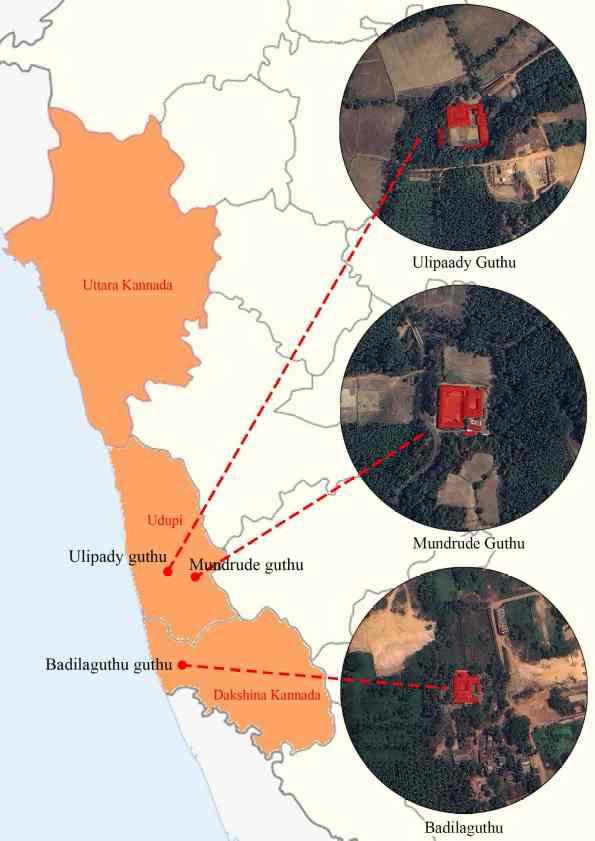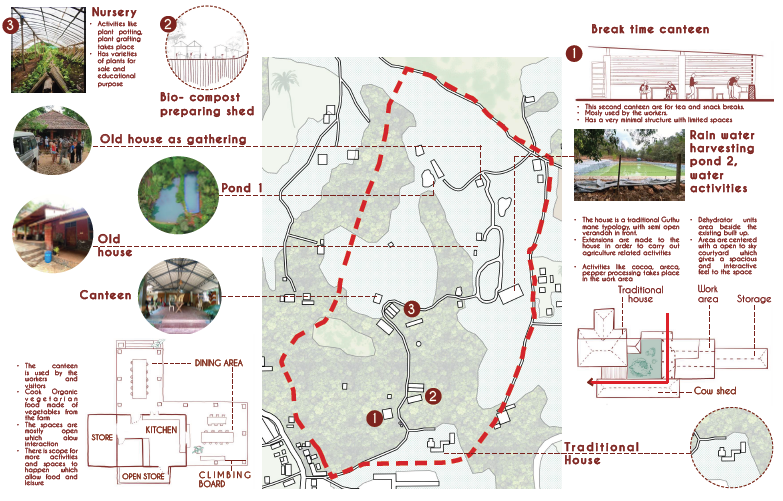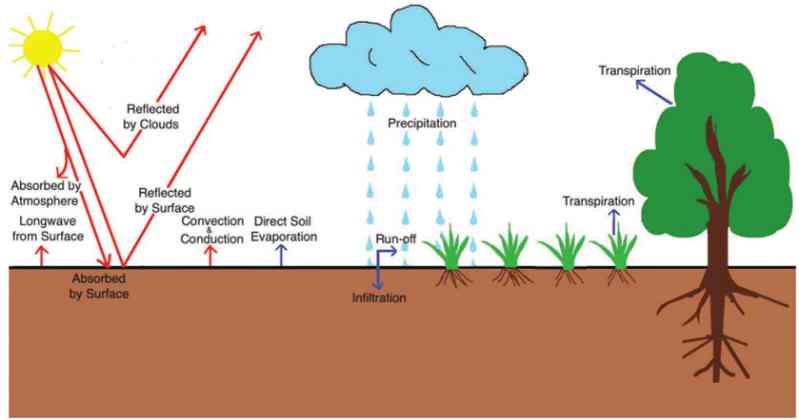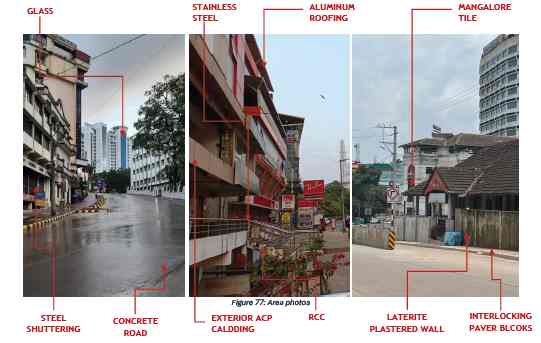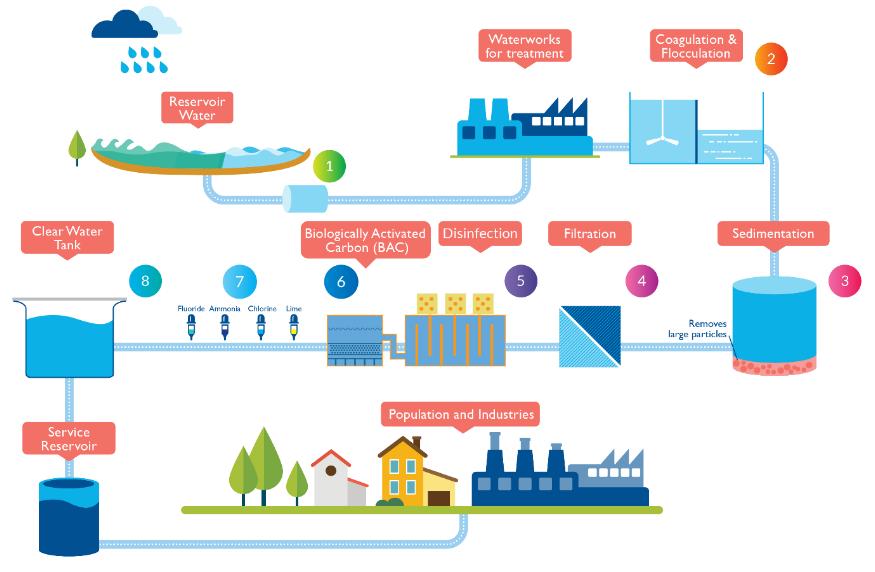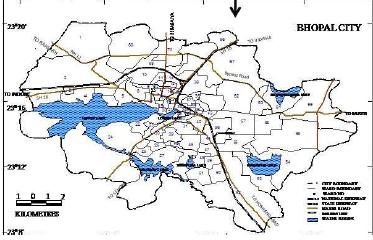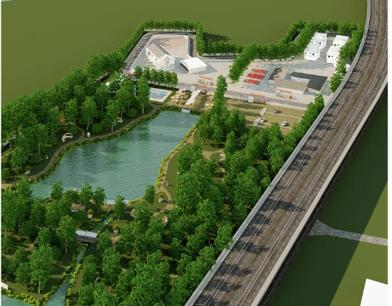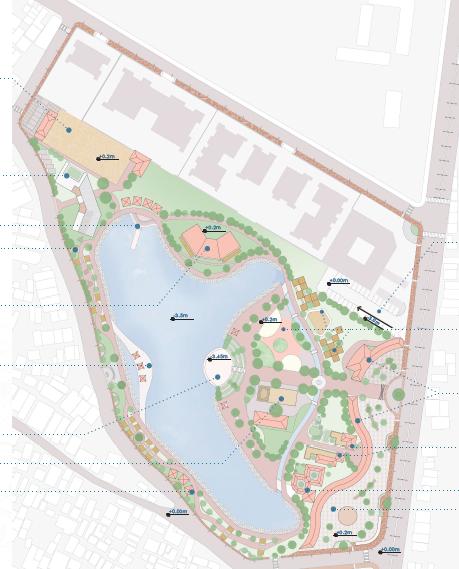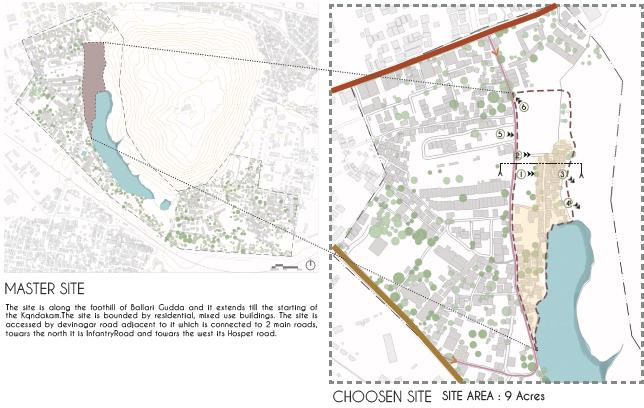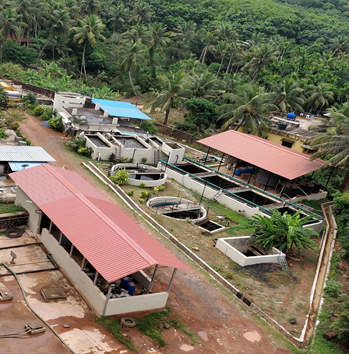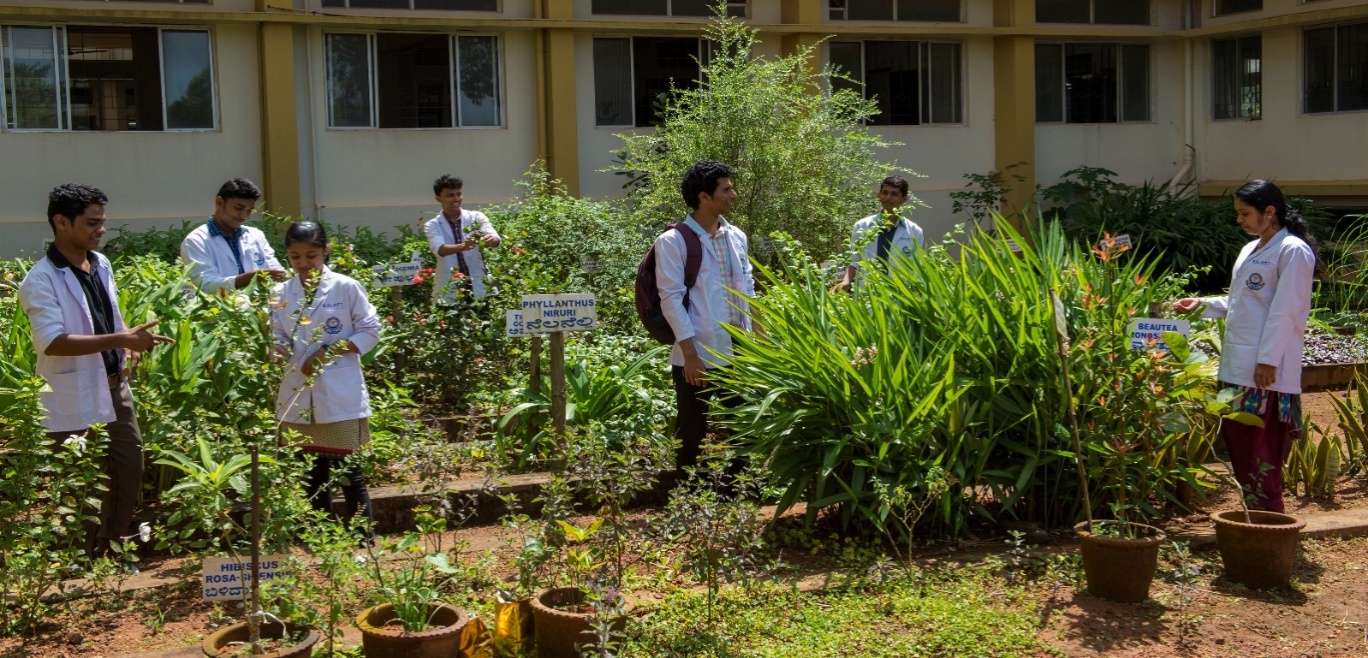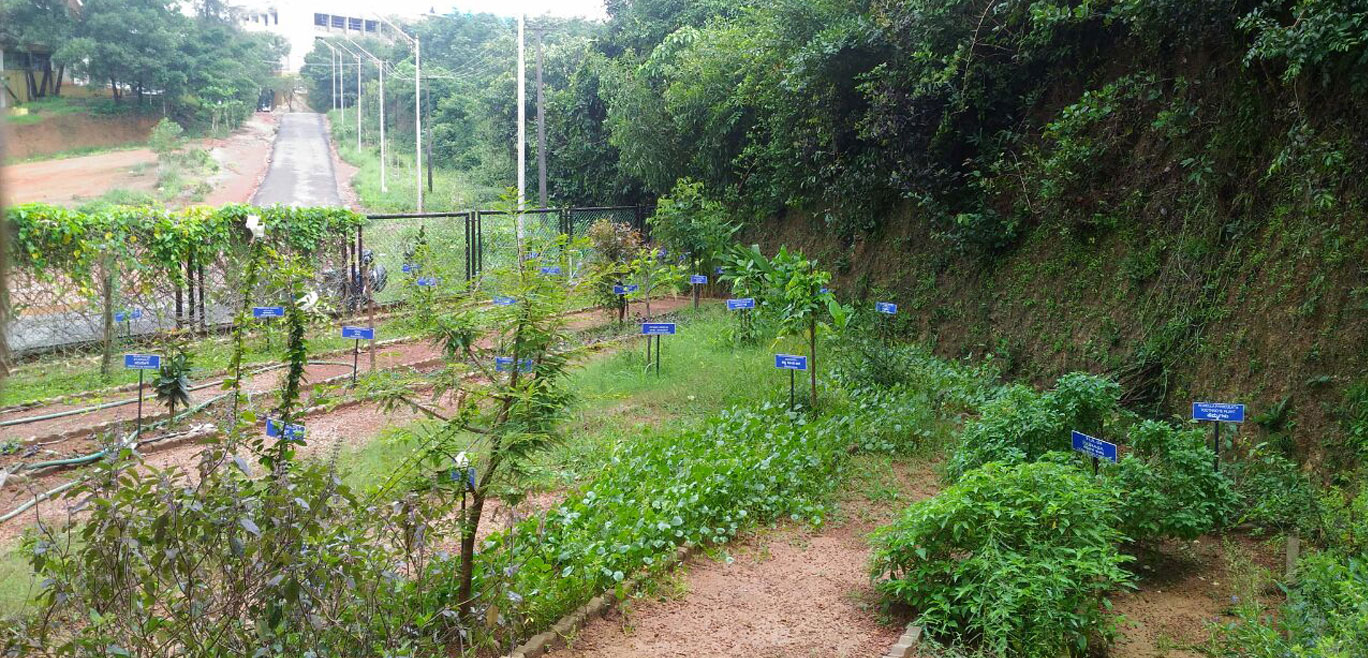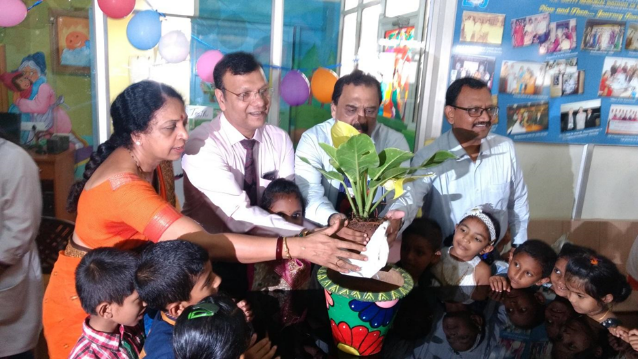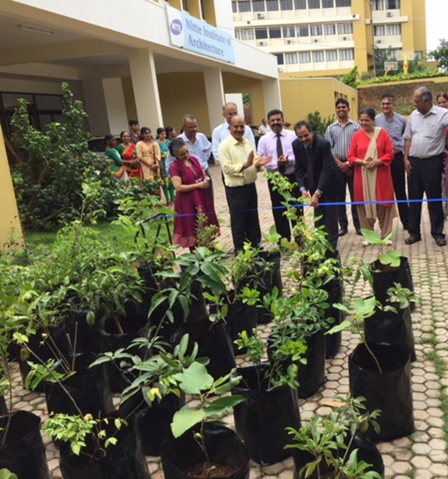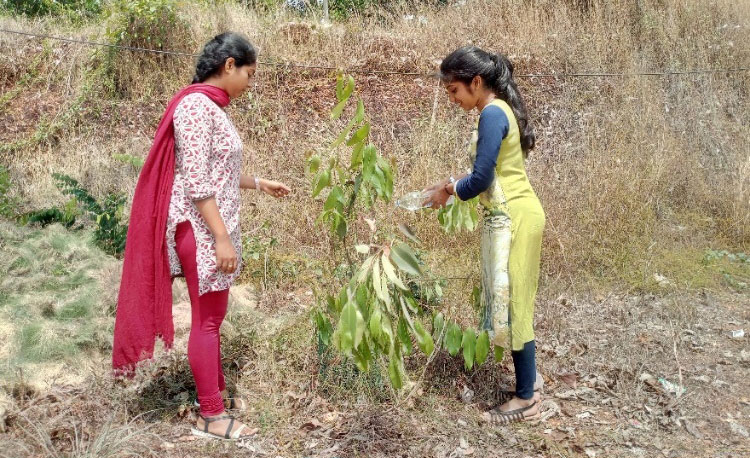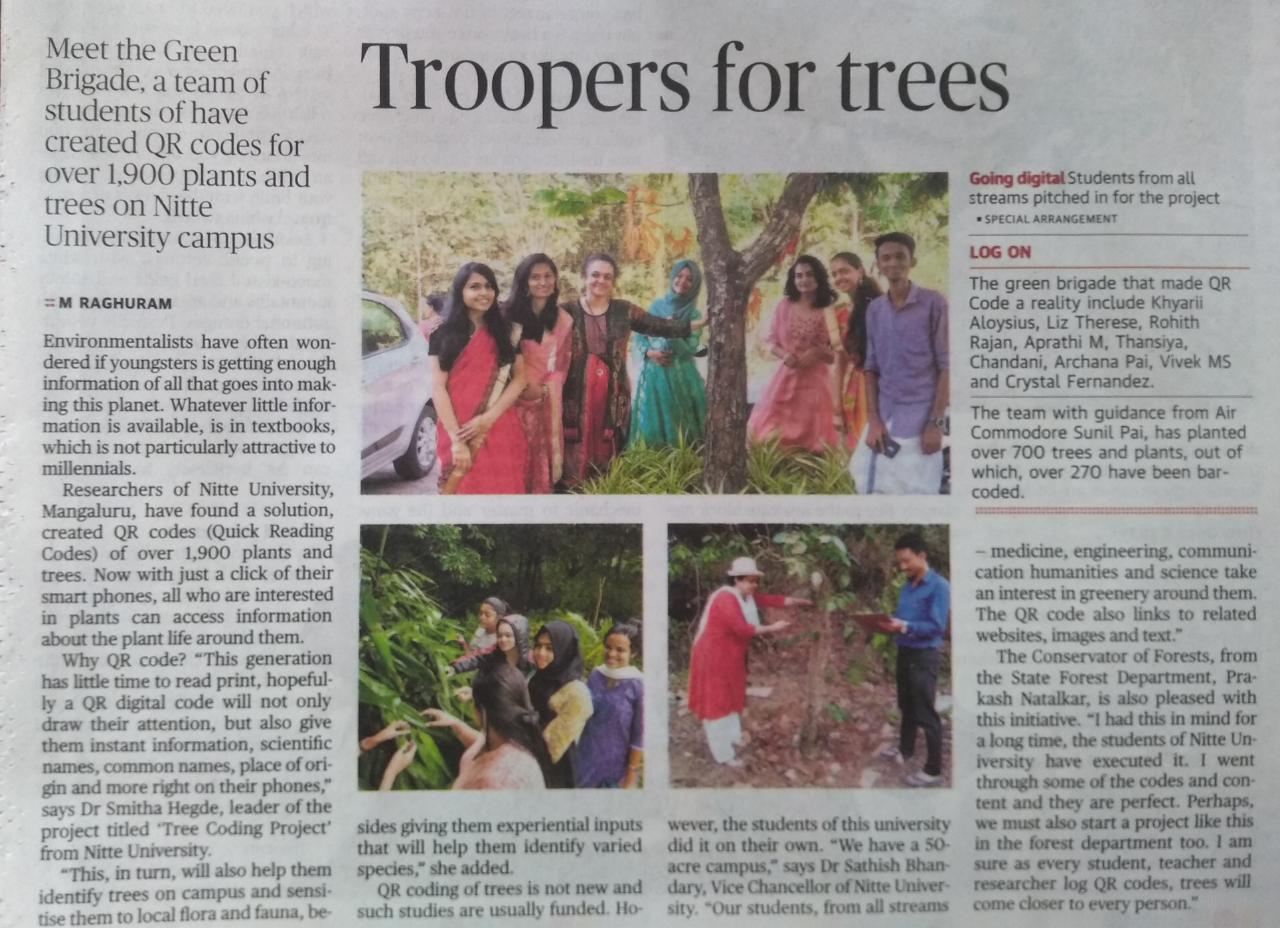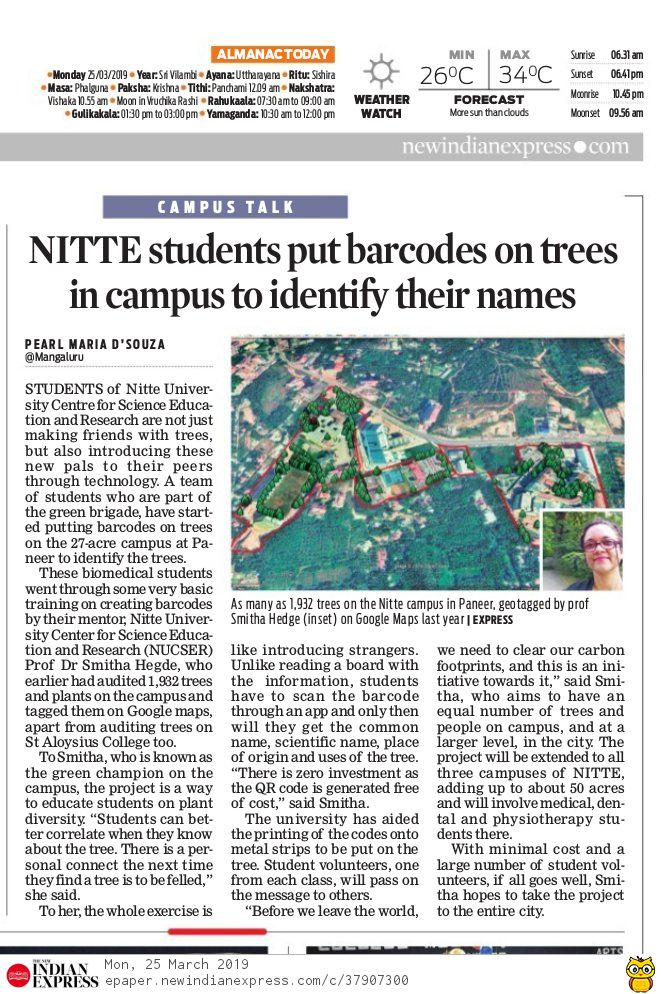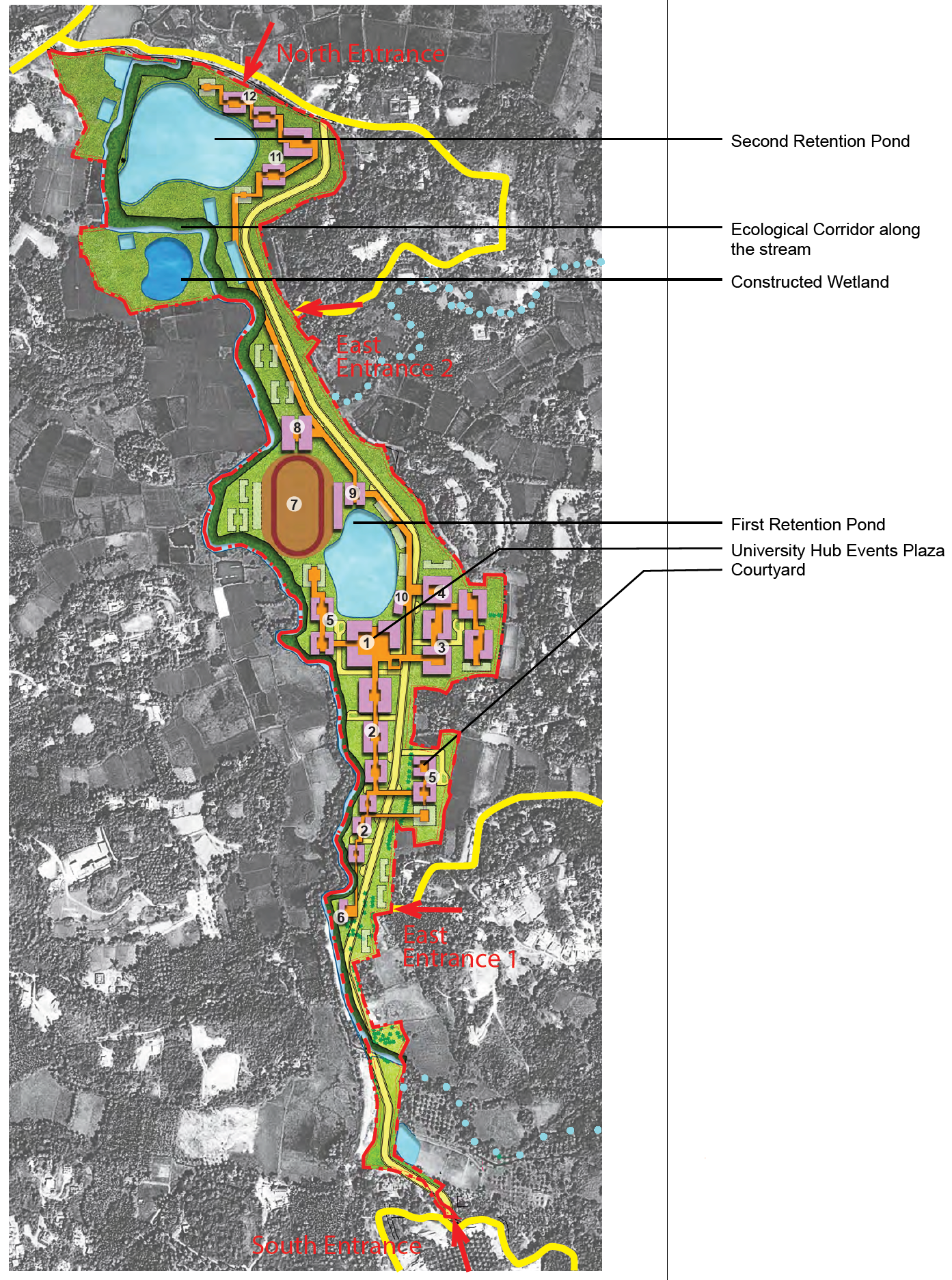
Water Conservation & Green practices on campus
Nitte (Deemed to be University) is proactively involved in water conservation mission. It has adopted environmentally friendly methods for water conservation and optimum utilization of water. Recycled water is used for maintaining the lush green landscape all-round the year. Rain water harvesting is adopted in all three Campuses of the University. Utilisation of open wells and water bodies for rainwater harvesting is practiced. Open wells are the preferred source of water in place of borewells. Its policies and strategies are focused on protection, conservation and sustainable use of its precious freshwater resources.
The university conducts environment, energy and green audits.
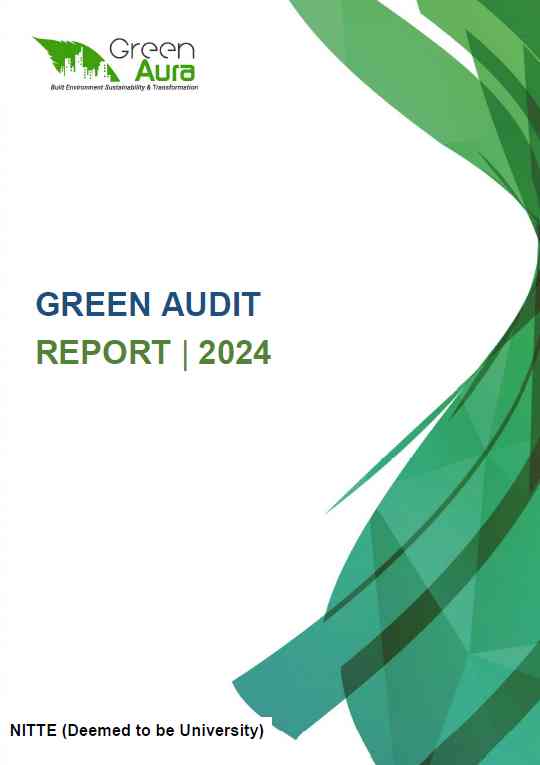
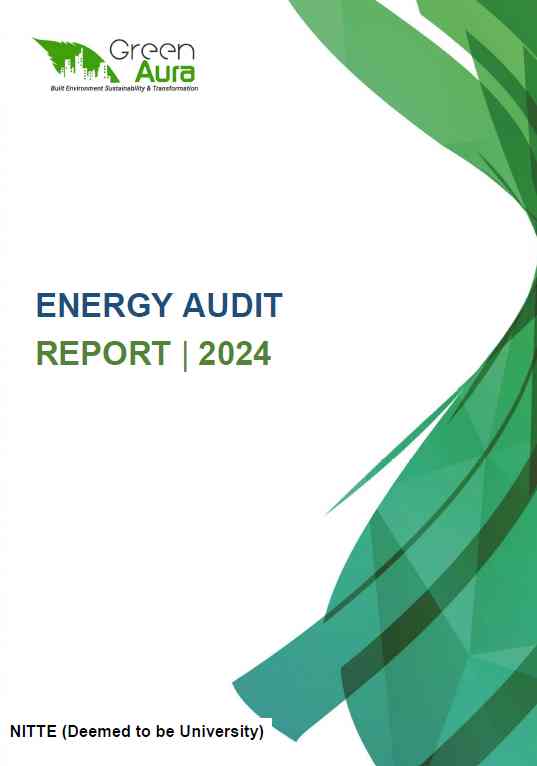
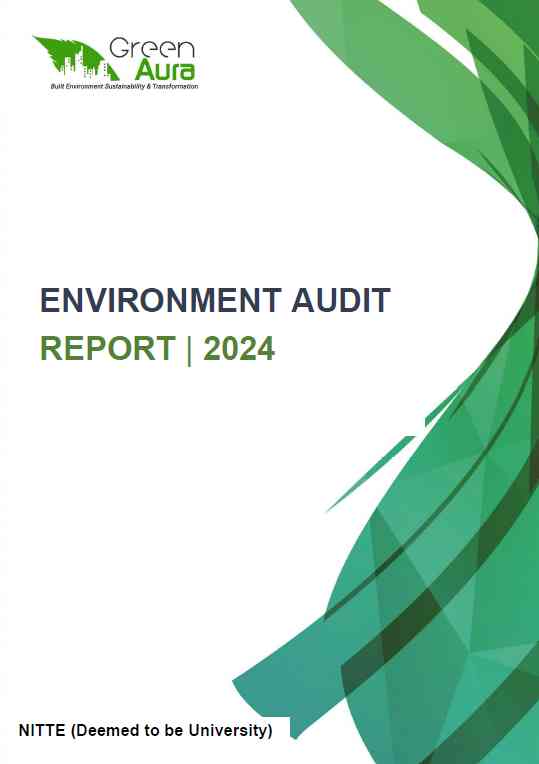

Water Audit for the Campus
NitteDU tracks water requirements, waste water generation and water recycling. This is done to inform policy decisions and to create awareness about water conservation amongst it’s stakeholders.
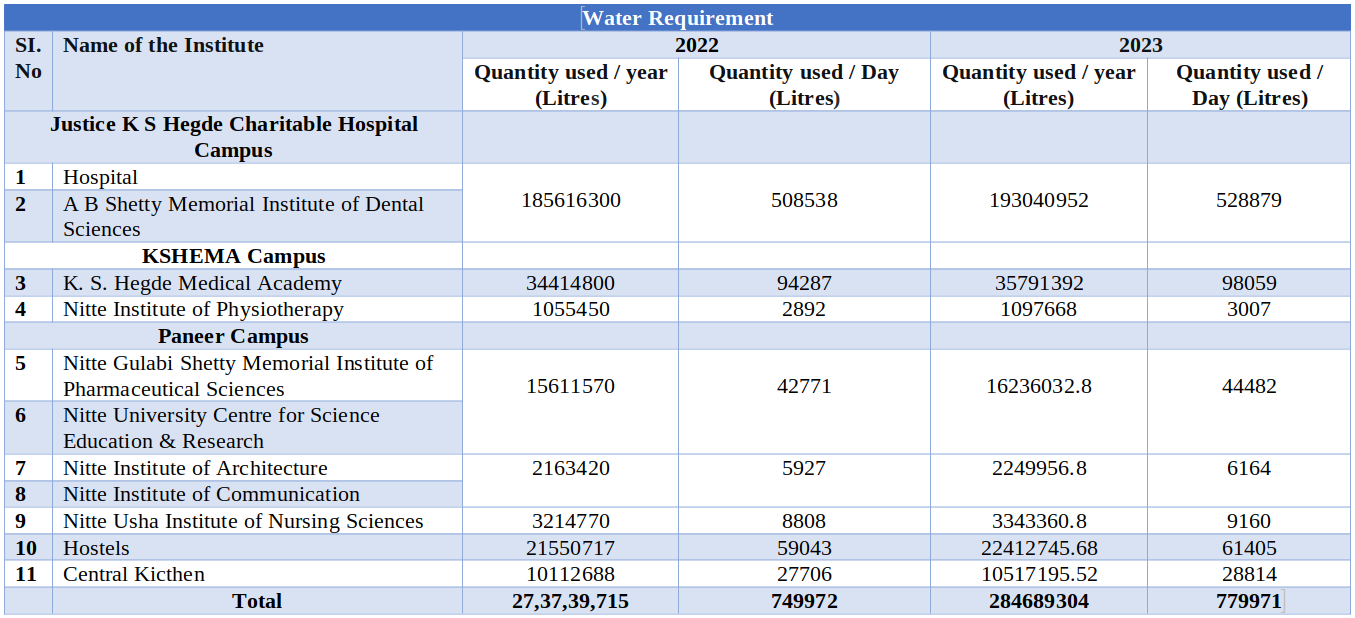
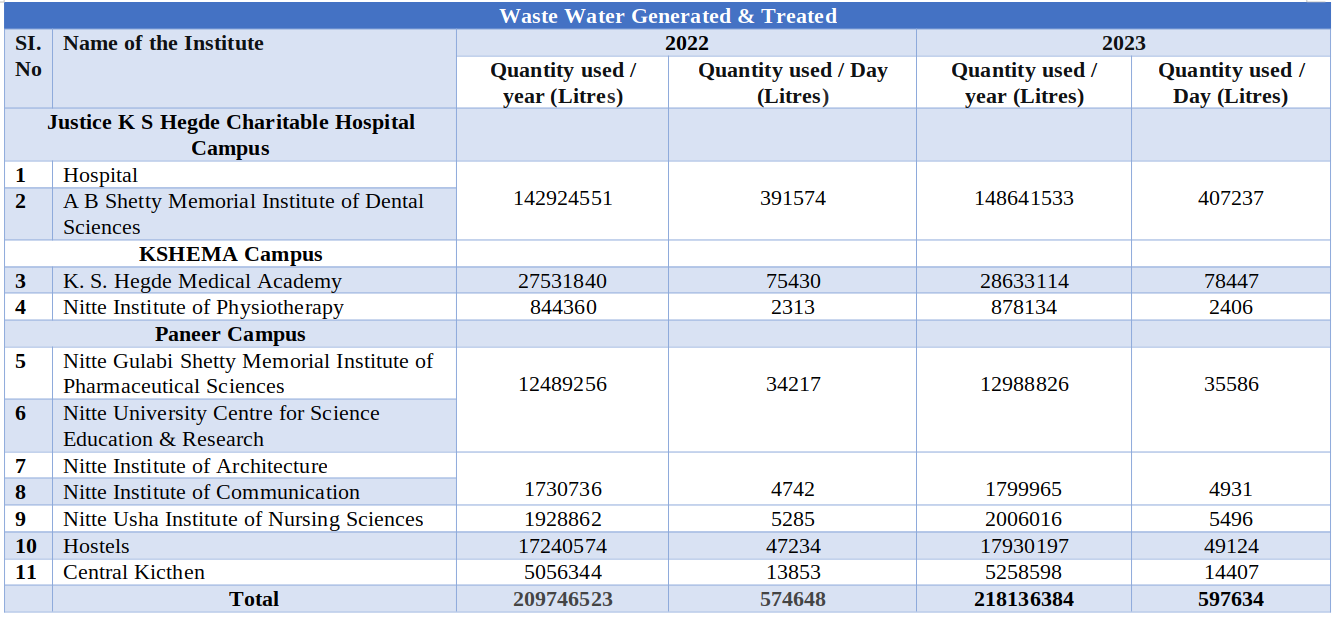
Water-conscious planting
Water-conscious planting initiatives by the university have significantly contributed to sustainability and environmental awareness on campus. By selecting drought-tolerant native plants, the university has created stunning landscapes that require minimal irrigation, thus reducing overall water consumption. The incorporation of rain gardens and permeable surfaces not only manages stormwater effectively but also enhances biodiversity and prevents runoff. Educational programs have engaged students in hands-on projects, instilling a sense of responsibility for water conservation and environmental stewardship. Furthermore, these green spaces serve as outdoor classrooms, providing valuable lessons in ecology and sustainable practices. Overall, these efforts demonstrate how thoughtful landscaping can foster a culture of sustainability while beautifying campus environments. Additionally, to mitigate the urban heat island effect, the university has strategically planted native, drought-resistant shade trees, shrubs, and groundcover. These efforts help regulate campus microclimates, enhance comfort, and support local wildlife, collectively reflecting a holistic approach to sustainable campus development.
Draught tolerant trees
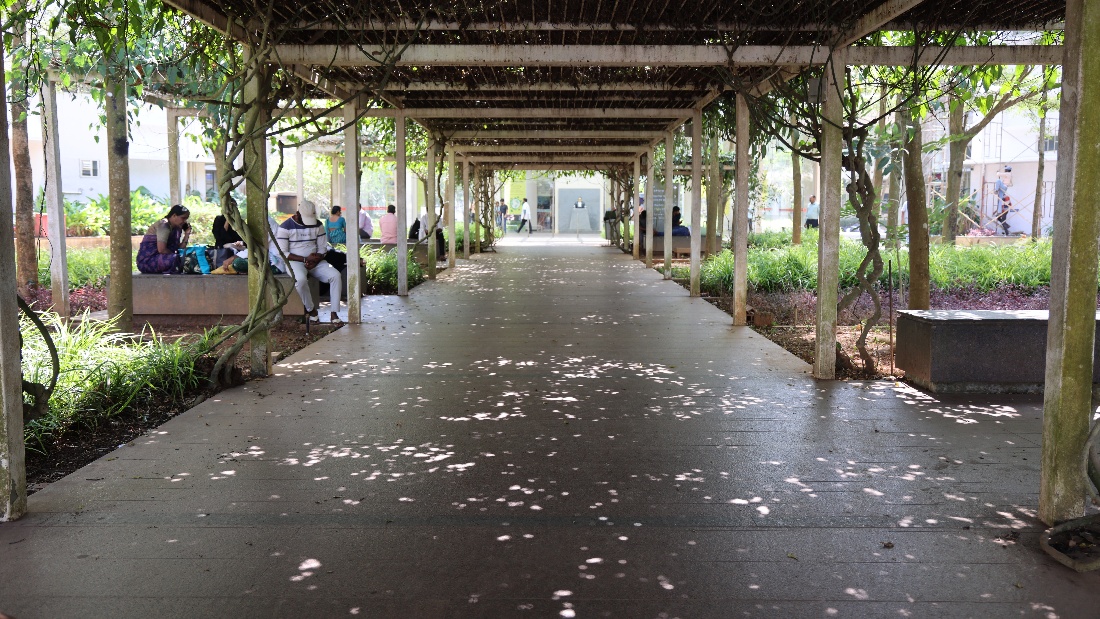
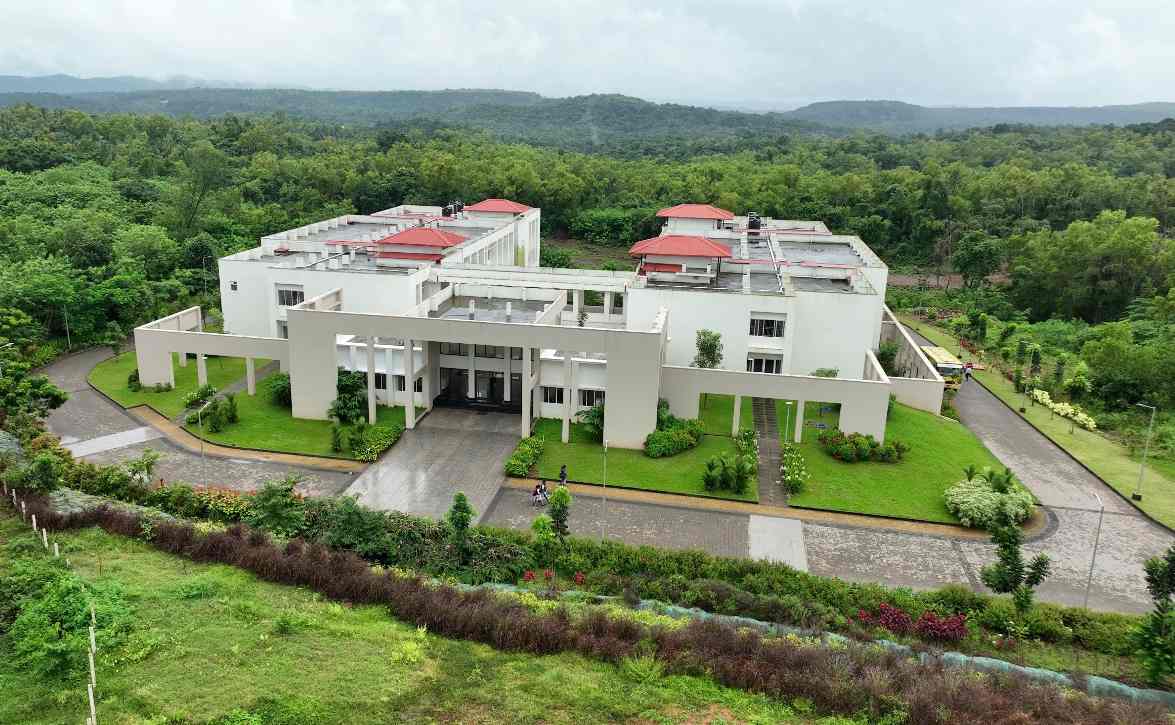
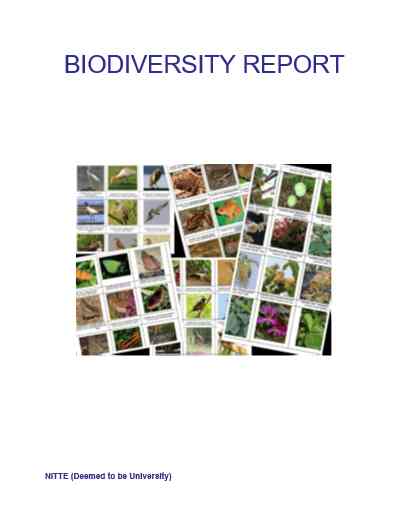
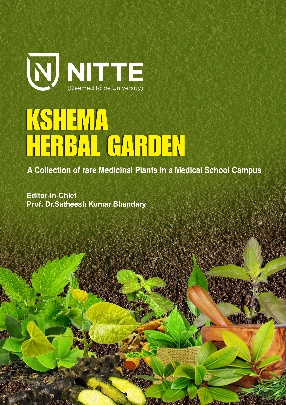
As part of its commitment to sustainability, the University has initiated a drought-resistant plantation program. Drought-tolerant species are carefully selected and planted during afforestation drives and ceremonial events such as visits by international delegates.

Rainwater harvesting
Being located in region which receives high rainfall during the monsoon season, Nitte (DU) makes efforts to manage and utilize rainwater effectively. Storm water drains separate from the general drainage system are in place.
Rainwater from roofs is collected using separate pipelines. This water is collected in raw water storage tanks which is then treated in a WTP consisting of pressure sand filter and activated carbon filter. Additionally, chlorine demand of the water is assessed and required dosage (Sodium hypochlorite diluted to 10%) is provided using automatic dosage pumps. The water is used for all domestic purposes.
The volume of rainwater in the three campuses is as follows:
- Justice K S Hegde Charitable Hospital: Approx. 2 lakhs litres of rainwater is collected with a heavy shower of 30 mins
- KSHEMA: Approx. 1.5 lakhs litres of rainwater is collected with a heavy shower of 30 mins
- Paneer campus: Approx. 1 lakh litre of rainwater is collected with a heavy shower of 30 mins
Promoting water conservation
Building practices for water conservation
NitteDU consciously incorporates water conservation practices while designing and constructing buildings on its campus.
- Construction is compliant with National Building Code of India 2016 (NBC 2016). Standards IS1172 and IS2064 related to Water Supply, Drainage and Sanitation are adhered to.
- Water conservation guidelines from Environmental Guidelines for Buildings, Ministry of Environment, Forests & Climate Change, Government of India are also referred to.
- Some of the practices followed are:
- Use of water retaining material like cloth / gunny bags etc. during curing
- Ponding” for retaining water on flat concrete structures for curing
- Use of curing chemicals / techniques to minimize water requirements
- Use of non-potable water for construction activities
- Use of water-efficient plumbing fixtures like push-cock taps
- Use of sensor-based taps
- Use of aerators, pressure inhibitors and flow regulators for ensuring constant flow
- Separate pipelines for potable water, water for recycling and treated water are provisioned for during construction
- Provision for rainwater harvesting
- Provision for management of storm water
- Rainwater storage ponds have been created in the campus for storage of storm water
- Rainwater from an artificially created storage pond from an external location near the campus is used. A MoU has been signed with the land-owner for use of this water
- Use of recycled water for flushing and gardening
Building Practices
Sensitization and training about water conservation
NitteDU undertakes sustained campaigns to encourage students and staff to save water within the campus.
- Modules on environmental sustainability, including water conservation, are included in the formal curriculum of most programs
- The National Service Scheme volunteers conduct campaigns to raise awareness about water conservation.
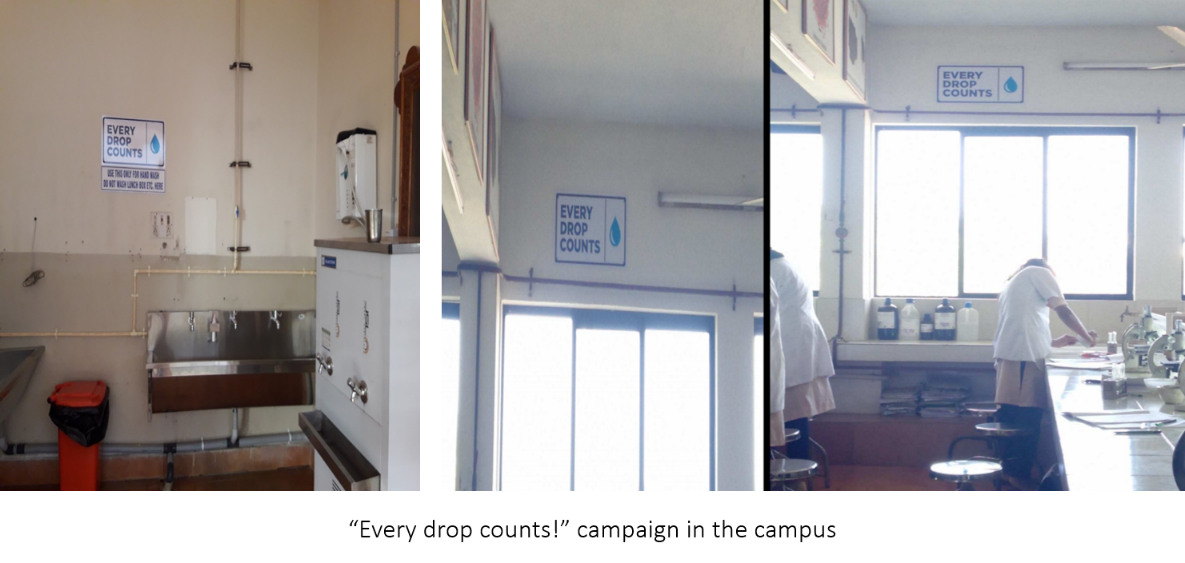
Students and staff of NitteDU are engaged in promoting responsible use of water in the community too. Some of the recent activities related to water conservation include:
- The students of the Department of Public Health, KSHEMA, have developed a short video titled "Jala" to observe World Water Day
- NitteDU Organized Webinar on "Innovative Solutions for Water Conservation"

https://www.youtube.com/watch?v=azBvOhRNdeA - Nitte DU published the patent “An automated water management system and a method thereof”. An automated water management system includes a water pump, control and communication units, and a user-friendly web application for remote monitoring. It uses IoT cloud integration and real-time water-level monitoring to ensure efficient control, reduced manual intervention, and improved water usage.
- Nitte DU published the patent “A water dispensing system” . The wireless Arduino-controlled water dispensing system integrates a Bluetooth module for seamless communication between the user's device and the dispenser. A user-friendly interface enables remote operation via Bluetooth commands. An Arduino Uno serves as the central control unit, while a relay ensures safe power management for the water pump. A battery-powered module enables portable, independent operation without fixed electrical sources. The outcome is a smart, safe, and mobile water dispensing solution that enhances user convenience and is ideal for off-grid or remote applications.
- Nitte DU has published the patent “A Water Aerator Retrofitting System.” This system is designed to enhance water efficiency and quality using a pottery clay aerator that infuses air into the water stream, reducing consumption without compromising flow. It includes clamps and screws for easy attachment to existing taps, a porous plate filtration tablet to remove impurities, and an aeration tip to optimize flow and minimize waste. Easy to install and use, the system supports sustainable water use, making it ideal for residential, public, and resource-conscious applications.
- Nitte DU published the patent “A system and method for retrofitting clay aerator into water taps”. The system offers an innovative solution for retrofitting clay aerators into existing water taps, enhancing both water efficiency and quality. It features a clay aerator that introduces air into the stream, reducing water usage without affecting performance. A clamp attachment allows easy, tool-free installation without modifying the tap. An integrated filtration unit, placed above the aerator, removes particulates to improve water quality. The system also includes a fastening mechanism for adjustments, connection tubing for controlled water flow, and a support bracket for stability. The outcome is a cost-effective, eco-friendly, and easily deployable solution suitable for residential and public use. p
- Nitte DU published the patent “A system of tetra screw-on faucet clay aerator with porous plate for water taps” . The system features a clay-based aerator device designed for taps without grooves or threads. It includes a screw assembly for secure attachment and multiple receiver units to ensure a stable fit. A porous plate at the top enables water filtration, while a thermoplastic polyurethane (TPU) gasket is positioned between the hose wall and tap to prevent leakage. This design allows easy installation on non-standard taps, enhances water quality through filtration, and ensures a leak-proof connection. The combination of materials and components ensures durability, adaptability, and functionality for a wide range of tap designs lacking conventional aerator compatibility.
- Nitte DU published the patent “A multi-leveled biodegradable filtration system” . A multi-layered biodegradable filtration system comprising a water tap as the source and a multi-level faucet aerator attached via clamps. The aerator enables effective water filtration through its layered design without requiring any modifications to the existing tap structure. This user-friendly setup ensures compatibility with standard taps while promoting sustainability through biodegradable materials.
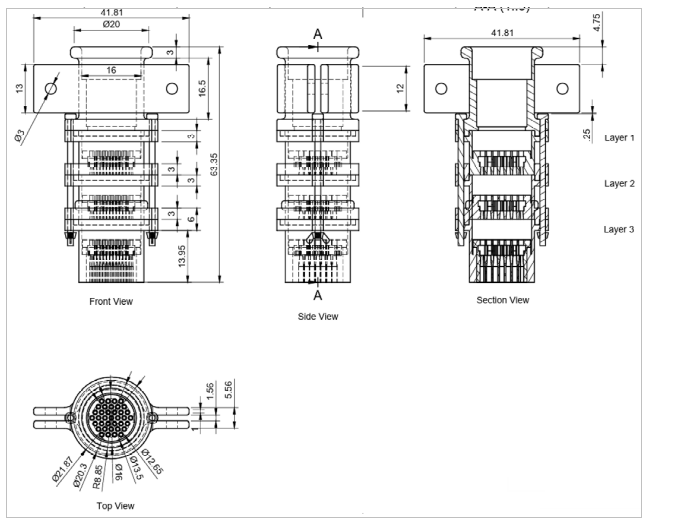
- Nitte DU published the patent “Zip-tag aerator and biofilter water purification system”. This innovative system features a flexible aerator body that forms a watertight seal with taps of various sizes and shapes. It incorporates a multi-layered aeration system to enhance water flow by introducing air into the stream. A robust zip-tag mechanism, connected via a hose section, ensures secure attachment to the tap. Within the aerator body, a multi-layered biofilter effectively removes particulate matter, microbes, volatile organic compounds (VOCs), and certain heavy metals. The design offers efficient filtration with easy, tool-free installation—no tap modification required.

- Nitte DU published the patent “AI based smart water and nutrient recycling system in aeroponics for real-time growth monitoring and adjustment for autonomous plant cultivation using deep learning algorithms” . Innovation integrates image processing, deep learning, and precise nutrient dosing to improve soil-less farming efficiency. It proposes an IoT architecture with four layers: device, fog, cloud, and application. Sensors collect data in the device layer, which the fog layer analyzes before sending it to Thingspeak and Firebase. Thingspeak provides historical data and visual insights, while Firebase stores processed images for monitoring plant health. The app displays these insights, ensuring visibility during fog layer failures to avoid data loss. Designed for water efficiency, the aeroponics system reduces water use compared to traditional farming methods.
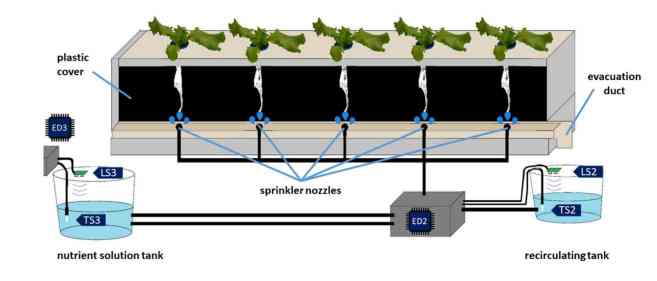
- Nitte DU has developed PureTrack, a compact, real-time air and water quality monitoring system. It detects air pollutants such as carbon monoxide, LPG, ozone, smoke, and methane, along with temperature, humidity, and dust levels. For water, it measures pH, turbidity, TDS, and temperature. Sensors interface with an ESP32 microcontroller, displaying data on a TFT LCD. Real-time updates are accessible via the Blynk app, with simple Wi-Fi setup through an onboard manager. PureTrack offers a user-friendly solution for pollution monitoring, enabling timely actions to protect public health and ensure environmental safety.
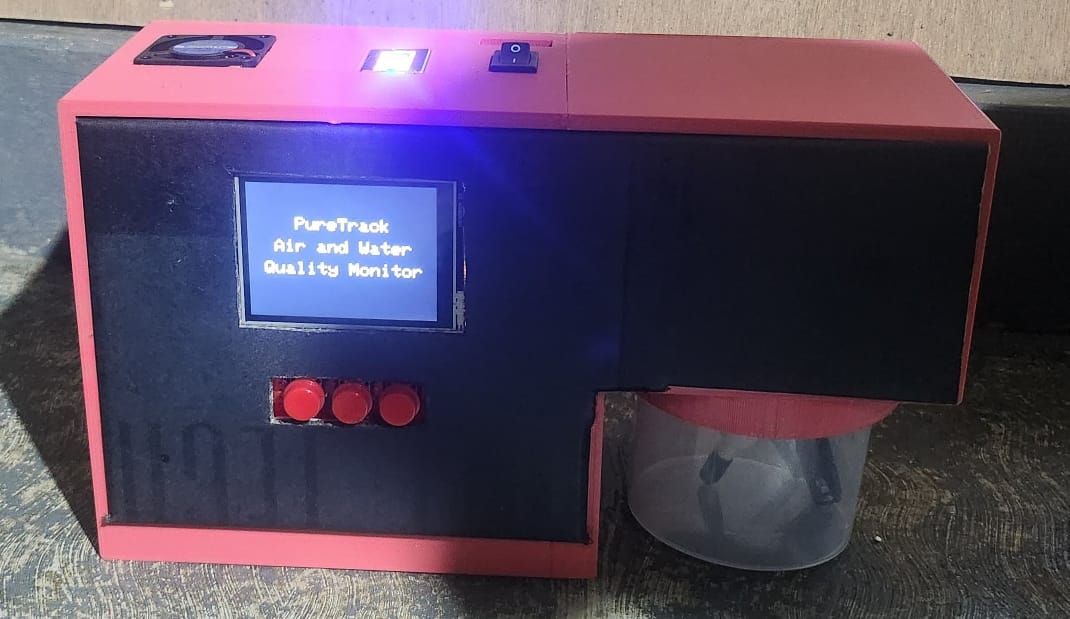
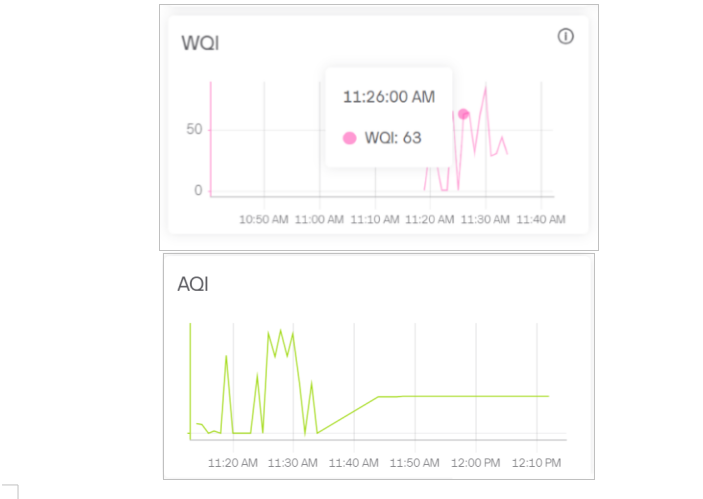
- As part of NitteDU’s water conservation efforts, a felicitation event was held on 25th November 2024 at Chathubai Farmland, Sullia Taluk, to honor Mr. C.K. Naveenchandra for his exemplary aquatic stewardship. Recognized for his contributions to freshwater pearl farming and integrated agriculture, Mr. Naveenchandra conducted a live demonstration on pearl inoculation, culture, and harvesting. His practical insights inspired attendees and encouraged students to explore entrepreneurial opportunities in aquaculture. Highlighting its profitability and sustainability, he emphasized the potential of such ventures to support rural livelihoods while promoting environmentally responsible practices.
- Promotion of rainwater harvesting off-campus - NitteDU purchases rainwater via a dedicated pipeline from an artificially created rainwater harvesting pond from an external location near the campus. This promotes rainwater harvesting storage at this off-campus location.
Lake rejuvenation
As part of the University’s commitment to sustainable development and environmental protection, NUCSER adopted the Someshwar Temple Lake in Ullal, Mangaluru, and organized a “Lake Rejuvenation” event on October 23, 2024.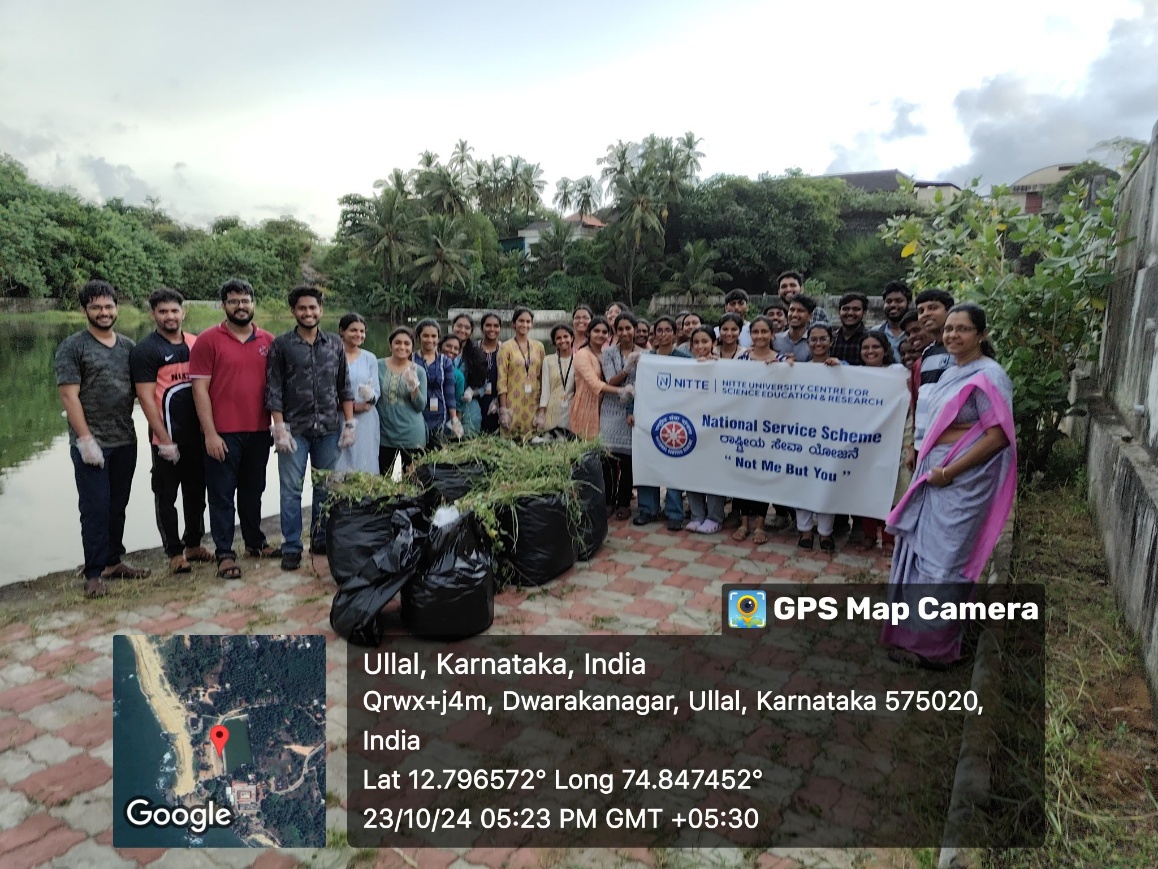
Assessment Visit for Water Body Rejuvenation at Kumpala Village
A preliminary site visit to the water body at Kumpala village was conducted on Tuesday, 10 December 2024, with representatives from the Rotary Club Mangalore, local Rotary community corporation members, and Nitte Institute of Architecture. The visit focused on assessing the current condition of the water body, its accessibility, and the surrounding areas as part of a futuristic rejuvenation proposal and community engagement project. The delegates from Rotary Club Mangalore, Nitte Institute of Architecture, Rotary community corporation participated in the site visit.
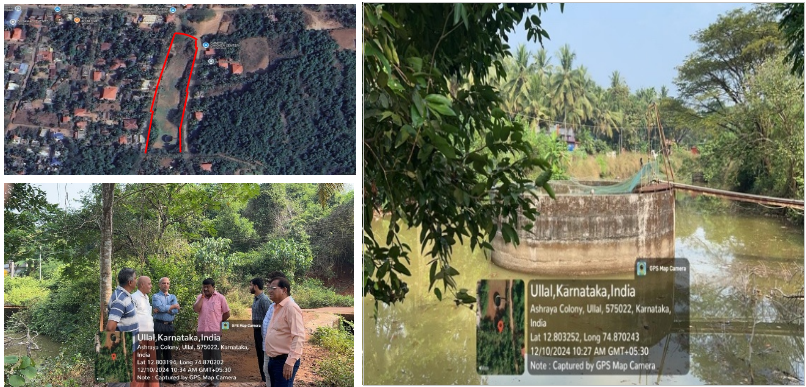
Promotion of Water Conservation & Irrigation Practices
NUCSER, NitteDU, in collaboration with the Department of Horticulture, Mangaluru, organised a program on "Water Conservation and Irrigation Practices" at Akshaya Farm, Talapady, on 23rd November 2024. The event was attended by farmers from the region, postgraduate students, and faculty members from NUCSER.
https://aboutnitte.blogspot.com/2024/12/news-from-nucser-sdg-program-on-water.html
As a part of the Sustainable Development Goals initiative, NUCSER in collaboration with the Dept. of Horticulture, Mangaluru organised a program on ‘Water Conservation & Irrigation Practices’ at Akshaya Farm, Talapady on 23rd November 2024. The event was attended by farmers from the region, postgraduates & faculty members from NUCSER.
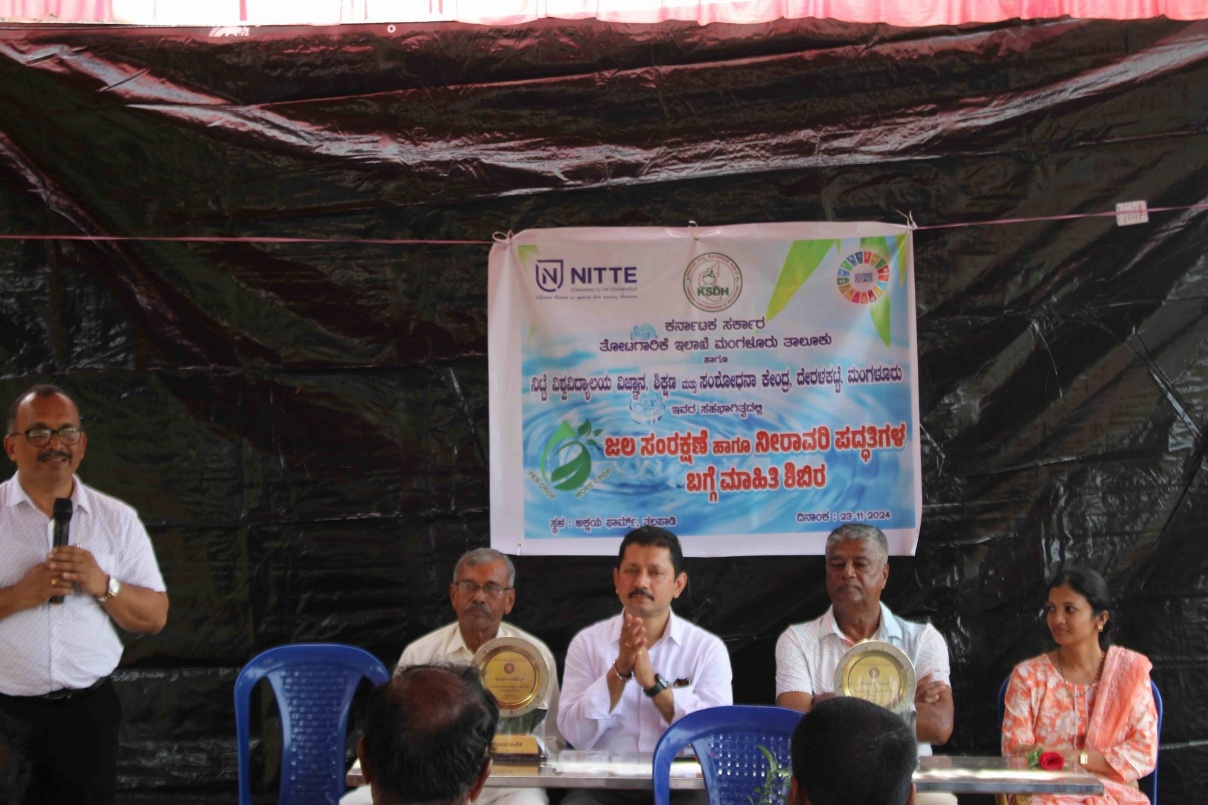
Awareness program on the occasion of World Water Day
On March 22, 2024, observing World Water Day, the Department of Public Health, KSHEMA, Nitte University, hosted a session with emphasis on the critical importance of access to adequate and quality water, addressing water scarcity, and enhancing water safety.
Webinar on Innovative solutions for water conservation
On December 19, 2024, the SDG Cell of Nitte (DU) organized a webinar on “Innovative Solutions for Water Conservation,” bringing together 62 participants, to explore sustainable water management practices. The session was led by Dr. Bhojaraja B.E., Associate Professor in the Department of Civil Engineering at NMAMIT, who addressed pressing issues such as groundwater depletion and the drying of water bodies.
https://youtu.be/azBvOhRNdeA?si=FYmuOO_Pe9EpKFHu
NITTE AQUA LENS 2024 Photography Competition
NITTE AQUA LENS 2024 Photography Competition invited participants to capture the essence of water conservation on campus through the lens of their cameras. The competition aimed to raise awareness about the importance of preserving water resources by showcasing impactful visuals that highlighted water-saving practices, conservation efforts, and the effects of water management.
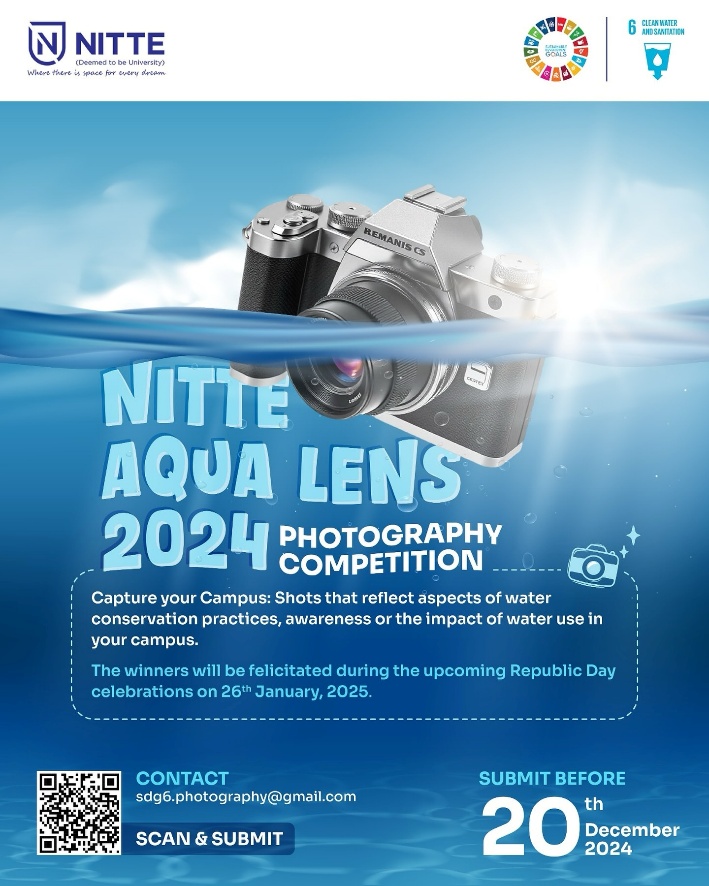
Good Aquatic Stewardship Award
Under the Sustainable Development Goals (SDG) initiative of Nitte University, NUCSER organized a program on 25th November 2024 to felicitate Mr. CK Naveenchandra for ‘Good Aquatic Stewardship Practices’ at Chathubai Farmland, Sullia Taluk, DK.
Mr. CK Naveenchandra was honored for his remarkable contributions to freshwater pearl farming and integrated agricultural practices. As part of the program, he demonstrated the techniques of pearl inoculation, culture & harvesting, inspiring participants with practical insights. Addressing the attendees, he encouraged students to explore entrepreneurial ventures in this field, highlighting the high potential for profitability.

https://aboutnitte.blogspot.com/2024/12/news-from-nucser-nitte-confers-good.html
Awareness on water quality
On World Food Day 2024, Prof. Indrani Karunasagar conducted an awareness session on “Right to Quality Food and Water,” highlighting the importance of safe food and clean water and educating participants about common hazards and their health impacts.
Awareness on water conservation and marine protection The NSS Wing of NUCSER joined the “Swachh Sagar, Surakshit Sagar – 2024” campaign at Tannirbavi Beach on 2nd October 2024 to promote awareness on water conservation and marine protection. The initiative emphasized the vital role of clean oceans and water bodies in sustaining life and ensuring a healthier planet for all.
Exhibition for school students on water conservation and climate change
On 18th December 2024, a model exhibition for school children was organized under the Nitte Climate Action Program to raise awareness about water conservation and climate change, fostering early understanding and responsible action among young learners.
https://youtu.be/Kdds1JJd4To?si=BWAhRyVFjw4EguYA
Promoting water awareness among school children
A “model and poster making” competition was organised on 30th November 2024 at Sri Ramakrishna Aided High School, Harekala. The students presented models and posters on the theme “water conservation”.
NitteDU hosts students from Komar University of Science and Technology, Iraq for a short-term internship program
Fifteen students from Komar University of Science and Technology, Iraq participated in a short-term internship program at NUCSER from 12th to 19th June 2024. The event was inaugurated in the august presence of Prof. Dr. M S Moodithaya, Vice Chancellor NitteDU, and Dr. Kawis Aziz Faraj, Vice President of Komar University of Science and Technology. During the program, the students received intensive training in various areas of biomedical science, including molecular techniques, handling non-mammalian animal models like zebrafish and Drosophila, and their applications in infectious disease biology, environmental toxicology, cancer biology, cell culture techniques, tissue engineering, as well as bio and nanotechnology.

https://aboutnitte.blogspot.com/2024/07/nucser-hosts-students-from-komar.html
Sustainable wastewater treatment system using reed bed technology
Reed bed technology utilizing Canna generalis was employed for wastewater treatment, leveraging its inherent phytoremediation and filtration capabilities to ensure efficient pollutant removal and improved water quality. The treated effluent was evaluated for its potential reuse in concrete production, thereby contributing to the reduction of freshwater consumption. Additionally, the study investigated the use of Canna leaf ash and sewage sludge ash as partial replacements for cement, along with the conversion of reed chaff into biogas. These integrated approaches promote a circular economy and demonstrate sustainable pathways for wastewater management and resource recovery.
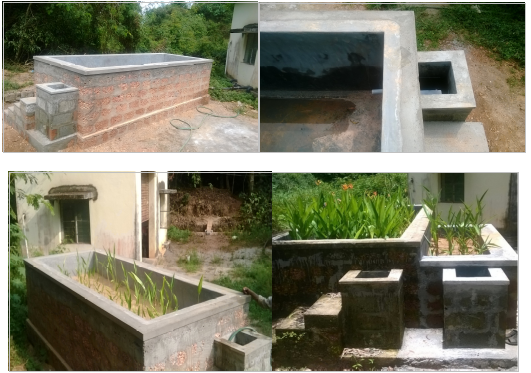
Water conservation projects with community
Nitte University has prioritized research on clean water and sanitation as part of its commitment to public health and community welfare. This focus addresses the critical challenges associated with water quality, access to safe drinking water, and effective sanitation practices. Here’s an overview of Nitte's initiatives and contributions in this vital area:https://www.sciencedirect.com/science/article/pii/S2589014X24001555
https://www.sciencedirect.com/science/article/pii/S0263876224004040
https://pubs.acs.org/doi/full/10.1021/acsomega.3c08151
https://bmcchem.biomedcentral.com/articles/10.1186/s13065-024-01128-z
https://www.sciencedirect.com/science/article/pii/S0254058424002852
https://ieeexplore.ieee.org/document/10750746
https://www.tandfonline.com/doi/full/10.1080/10889868.2024.2432400
https://www.sciencedirect.com/science/article/abs/pii/S0141813024019639?via%3Dihub
Nitte DU developed “Unmanned vessel for water pollution monitoring”. Water quality monitoring is essential for environmental preservation and safe water use. Current systems allow real-time, automated assessments of parameters such as temperature, turbidity, pH, and total dissolved solids (TDS). IoT-based system for continuous, remote water quality monitoring. Sensors wirelessly send data to the Arduino Cloud, accessible via desktop or mobile devices. The system uses an ultrasonic A220YUW sensor to detect floating waste and visual pollution. An autonomous unmanned vehicle, controlled by an Arduino Nano RP2040, maps water quality variations across rivers, lakes, and ponds, initiating corrective actions when safety thresholds are exceeded.

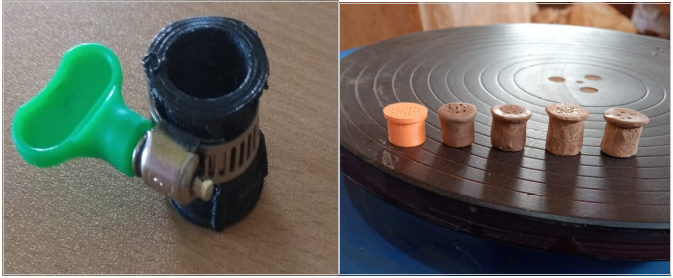
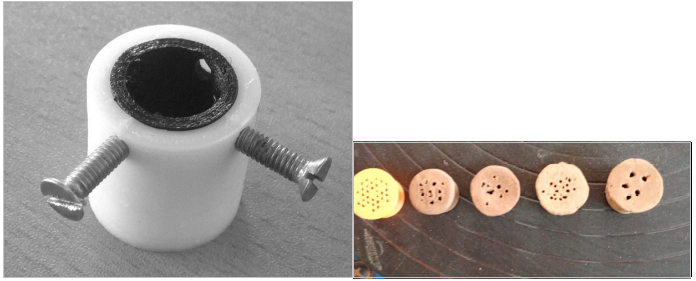
Water Recycling
Use of recycled water for gardening and toilet flushing purposes. The wastewater is collected and treated in Sewage Treatment Plants (STP). Three campus have individual STPs. The KSHEMA campus has a STP plant of handling capacity of 4,00,000 liters/day. University and Hospital campus have a plant of 8,00,000 liters/day and Paneer campus has a plant handling 2,50,000 liters/day.
Treat WastewaterWater safety and quality
All students, employees and visitors to the constituent units, sections, and centres of NitteDU have free access to clean drinking water. Drinking water is available through UV based water purifier dispensers. The quality of water is assessed periodically through both in-house and external testing.
All major buildings have separate storage facilities for potable and non-potable water. Segregated storage tanks and pipelines are available for potable water, stormwater and grey water.
Plumbing Diagram, University Buildings
Drinking water access
Collaborations for water security
| Collaboration with International Finance Corporation (IFC) for EDGE (Excellence in Design for Greater Efficiencies) Nitte University collaborates with IFC to provide training on EDGE certification. EDGE is an innovation of IFC, a member of World Bank Group. IFC created EDGE to respond to a need for a measurable and credible solution to prove business case for building green and to unlock financial investment. The aim is to achieve zero net carbon, lowest possible water uses and low embodied energy of material, a good amount of daylight, design for natural ventilation and a green, affordable, and local design. |  |
| Indo German Centre for Sustainability (IGCS), Summer School 2021 The Department of Public Health, KS Hegde Medical Academy participated in the Indo German Centre for Sustainability (IGCS), Summer School 2021, themed "Sustainable Water Management at the Saltwater – Freshwater Interface". The summer school was held between 12th & 23rd July 2021 and focused on environmental protection, water resource management, energy, land use, rural development and waste management. The school also discussed means to promote sustainable development in Germany, India and South Asia. It was Conducted by the Indo-German Centre for Sustainability, CAU Kiel University, Germany, in collaboration with IIT Madras. | 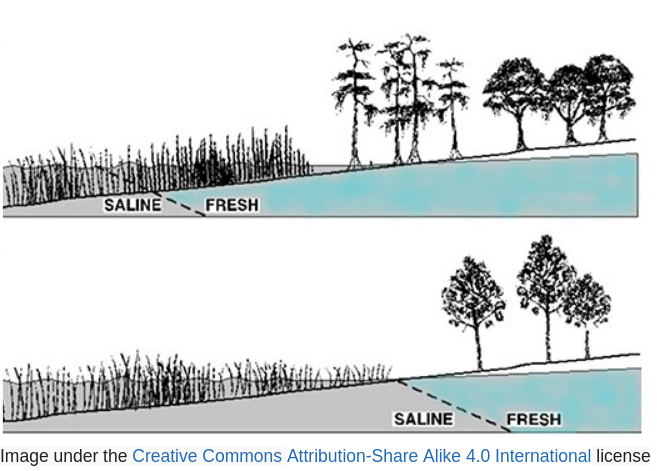 |
| The Nitte University Centre for Science Education and Research has established a “Center for Developing Sustainable Technologies for Mitigating Heavy Metal Pollution Under Changing Environment” with support from Vision Group on Science and Technology, (VGST) Department of Electronics, IT, BT and S & T, Government of Karnataka. The scope of the center includes screening for heavy metal pollution and developing technologies for mitigating such pollutants in water and soil.
More details |
 |
| NitteDU conducted a study for assessing the quality of ground water in various wards of Mangalore City Corporation. Ground water samples were collected from different parts of the city and analyzed for color, pH, turbidity, fluoride and iron content. This project helped raise awareness about ground water contamination and provided data for the City planners. |  |
| NitteDU has entered into a collaboration with the Secretary of State for Environment, Food and Rural Affairs, Govt. of United Kingdom for scientific cooperation with Centre for Environment, Fisheries and Aquaculture Science (CEFAS), UK, an EU Reference Laboratory for Biotoxins. Scientists at Nitte University Centre for Science Education and Research (NUCSER) have been working with CEFAS Scientists in areas of food safety and microbiological risk assessment for many years. When thre was an outbreak of Ciguatera fish poisoning in Mangalore, affecting over 200 people in 2016, NUCSER collaborated with CEFAS for chemical characterization of toxins through a project funded by the UK National Environmental Research Council (NERC) Emergency Fund. |  |
Medicinal Gardens
The KSHEMA campus as well as Paneer campus have medicinal gardens. A total of 125 medicinal plants are planted and cataloged for its scientific name, common name, medicinal uses and their major chemical components reported.
Indoor plants
The A.B. Shetty Memorial Institute of Dental Sciences is in the University Campus. Although this campus has the least green cover as compared to Paneer or Medical College campus, they have a good practice that targets the improvement of indoor air quality. Every common room has indoor plants which is well tended and provides healthy oxygen rich air and reduce the carbon-di-oxide released by the human occupants. The Institute has always supported the concept of Clean City Green City in college by various initiatives.
Kitchen and a terrace garden
Nitte Institute of Architecture has developed a kitchen garden as well as a terrace garden to educate the students on the design of urban horticultural practices. The kitchen garden has several vegetable crops and the a terrace garden has over 50 fruit trees such as Figs, Jamoon, Chikoo, Guava, Mango, Lemon etc.
Tree Adoption
The Students of Nitte University Centre for Science Education and Research has a good practice of tree adoption. Undergraduate student volunteers have adopted several trees on campus. They ensure proper watering and care during the dry months of summer. Weak saplings are preferred for adoption over healthy trees.
Vanamahotsava
Students actively participate in the Swachh Bharath Programs conducted regularly by the NSS unit of the University. 39 programs with nearly 4000 students and staff participation was recorded over a period for last four years. Vanamahostava is conducted during the first week of July by tree planting and conducting awareness programs. The world environment day is also conducted in the campus by planting saplings and the theme of the United Nation is deliberated eg. “Connecting people to Nature” in 2017 and “Beat plastic pollution” in 2018.
Plant a Tree on your a Birthday
Planting a sapling on birthdays is like leaving something memorable for the campus community and one can enjoy that excitement whenever they visit the campus later in life. Birthdays can be made memorable and in turn, we can improve the biodiversity of the university campus. Behalf of Nitte University Green Initiative Project (NUGIP) started “Plant a Tree on Your Birthday” in KSHEMA campus for the teaching staff. The initiative, ‘Plant a Tree on your Birthday’ was launched with the first sapling sharing its birthday with Prof. Dr. Satheesh Kumar Bhandary, Dean, KSHEMA and Prof. Dr. Sukanya Shetty, HOD, Biochemistry. Dr. Jayaprakash Shetty, Registrar KSHEMA, Dr. Smith Hegde, NUGIP Co-ordinator, Dr. Sumalatha Shetty, NSS Co-ordinator, Mr. Shashi kumar Shetty, NUGIP Green Officer (KSHEMA Campus), Dr. Nanjesh and Dr. Sachin, NSS Program Officer were present on the event.
Regular planting drives are conducted to maintain a green and clean campus. Recommendation made by the committee is implemented in the new developmental plans of the University. The University campus conducts regular air and water quality testing to confirm the availability of healthy water and air. The tests are conducted by an independent agency and validated. All parameters tested are well within the permissible limits. Thus clean air and water supply is maintained on campus.
Common transport facilities
Staff, students and other employees are strongly encouraged to avail the common transport facilities provided by the University. There are 16 buses which cater to the common mode of transportation. An additional of 6 vans of 14 seater capacity regularly commute between campuses and city to transport staff, students and other employees of the University.
The staff and students of the University have conducted several programs in-house, as well as in public schools to create awareness on cleanliness, vaccination and hygiene.
Towards a greener future
NitteDU is poised to expand its campus in Mangalore. A 100-acre parcel of land near the current campus has been ear-marked for development of new campus. In line with its commitment to creating sustainable and re-generative spaces that have minimal impact on the environment, the masterplan for developing these associated grounds is based on key strategies specific to the site that helps NitteDU set exemplary standards in the domain of sustainable landscapes.
India has pledged in the Paris Agreement 2015 to reduce emissions by 30-35% below the 2005 emission intensity of GDP by 2030. Hence aligning with the 8 missions identified under National Action Plan for Climate Change, the following fundamental concepts have been considered in the campus master planning process:
- Micro Climate Modifications
- Efficient Water Cycle
- Clean Energy
- Ecological and Biodiversity Enhancement
One of the key aspects of the plans for this development is the preservation of existing water bodies and tree cover in the land. The water bodies sustained by rainwater which will be important source of water for the campus community. These water bodies will also help in preserving and supporting the biodiversity of the campus.
More Details
Innovative approach to water conservation of paneer campus
The innovative approach at Nitte Paneer Campus emphasizes the significance of its unique topography as a valuable asset. The design response is particularly sensitive to the natural contours of the site, ensuring that the landscape is respected and preserved.
This project proposes an innovative strategy for water conservation, with a strong focus on rainwater harvesting. A pond has been strategically positioned at the lowest contour of the site, acting as a natural collection point for surface water runoff. Additionally, drainage systems are managed through careful consideration of level differences, effectively enhancing the campus's water management capabilities.
Nitte Sustainable Landscapes
The innovative approach at Nitte Paneer Campus emphasizes the significance of its unique topography as a valuable asset. The design response is particularly sensitive to the natural contours of the site, ensuring that the landscape is respected and preserved.
This project proposes an innovative strategy for water conservation, with a strong focus on rainwater harvesting. A pond has been strategically positioned at the lowest contour of the site, acting as a natural collection point for surface water runoff. Additionally, drainage systems are managed through careful consideration of level differences, effectively enhancing the campus's water management capabilities.
Strategies to minimise physical, chemical and biological alterations of related aquatic ecosystems
The policies and strategies of Nitte (DU) are focused on the protection, conservation, and sustainable use of its precious freshwater resources with minimal alteration of the natural water ecosystem.
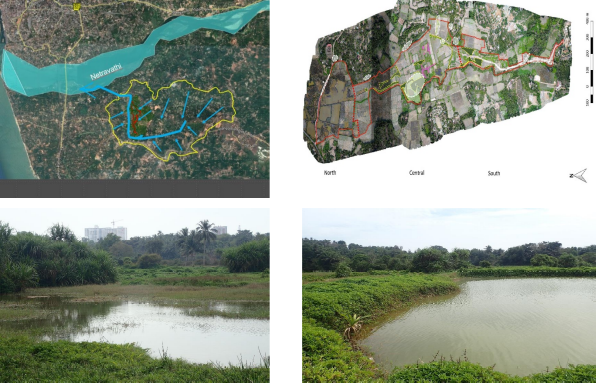
Strategies for minimum alternation of natural water ecosystem:
Enable natural paths for groundwater flow:Nitte campus development plan includes the design and development of natural water flow trenches that lead to a natural collection pond. Such trenches are developed using the natural contour of the terrain.
Retaining natural ground surfaces for water flow:
The local terrain is rich in laterite soil. The construction of bunds for the flow of water is designed using laterite bricks instead of concrete facilitating minimal alteration to surface flowing water on campus.
Conservation and protection of existing natural water ecosystems:
The new campus is located in the brackish water region of the Netravati River. With a strong intent of conservation. The campus is planned to build with water as the theme of the campus. Special attention is paid to the retention of the feeding and nesting habitat of the aquatic birds, fishes and plants.
Conduct research and monitoring of water quality:
NUCSER, Nitte DU conducts regular monitoring of water quality, biodiversity, and ecosystem health to identify emerging issues and support scientific research to better understand the dynamics of aquatic ecosystems and inform conservation strategies.
Providing education to the community:
Nitte DU always engages with the local communities in conservation efforts and educate them about the importance of maintaining healthy aquatic ecosystems. To foster a sense of responsibility and ownership among communities for the protection of water resources. This includes awareness programs to protect wetlands, mangroves, and other critical habitats that serve as nurseries and breeding grounds for many aquatic species.
Proper waste Management:
Nitte DU in collaboration with Mangala Resource Management Pvt. Ltd. Initiated the proper waste disposal practices to prevent pollution of water bodies. It promotes recycling and waste reduction measures to minimize the environmental impact of waste.
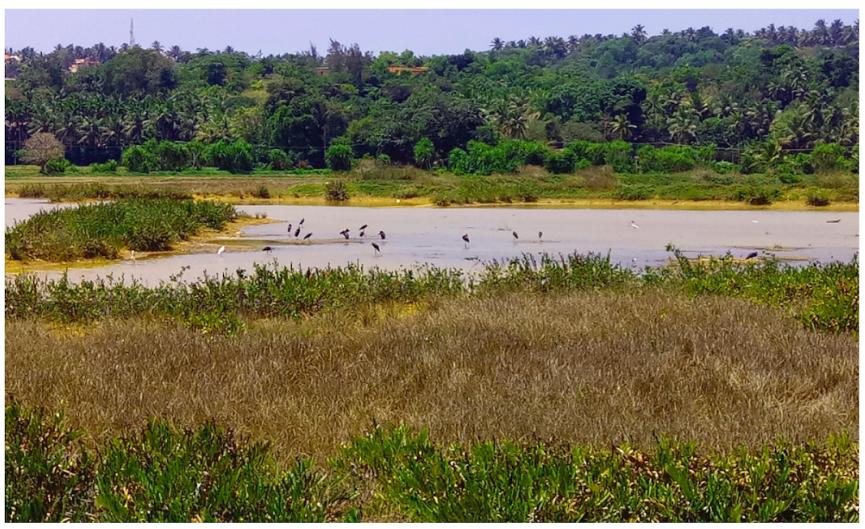
Monitoring the health of aquatic ecosystems
Monitoring the health of aquatic ecosystems involves a systematic approach. The monitoring parameters adopted by Nitte DU are to measure the temperature, pH, dissolved oxygen, nutrient levels, and the presence of key species.
Water quality analysis:
-
Fresh water sources at the campus
Nitte DU undertakes water quality analysis within its local vicinity every year. The campus harbours 4 natural lakes and an open well. The water quality of the waterbodies is sampled to maintain and monitor health of the aquatic ecosystems.
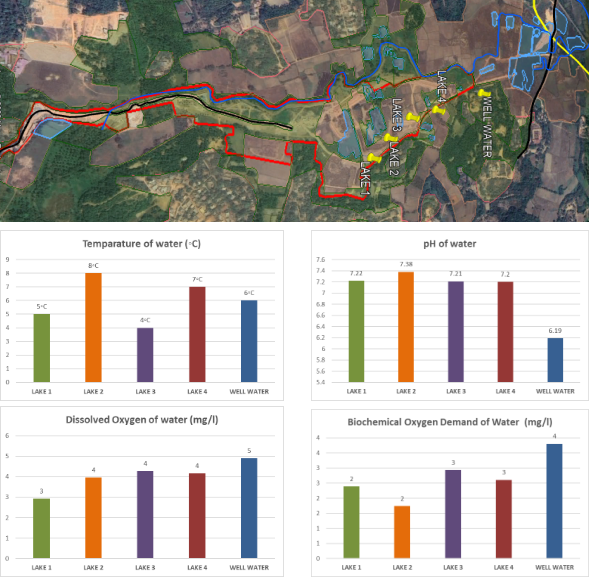

-
Treated wastewater:
The quality of the treated wastewater is monitored prior to disposal of the same for watering plants. The drinking water well samples are monitored for various parameter for potability and usage.
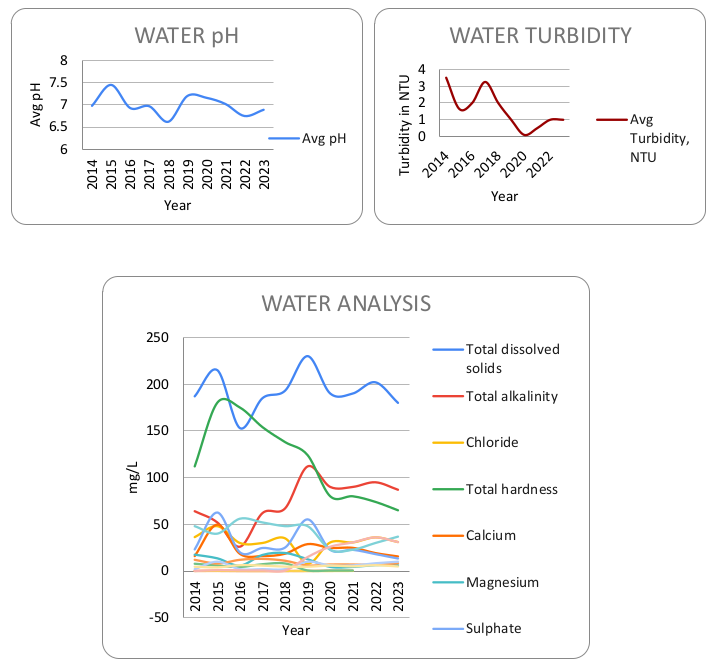

-
Fresh water sources in the local area:
Nitte DU conducted study on the geospatial distribution of Fluoride and Iron in natural water sources within Mangalore City. Through meticulous research and analysis, the study aims to provide a comprehensive understanding of the presence and variability of these elements, contributing valuable insights for water quality management and public health initiatives in the region.
https://www.thieme-connect.de/products/ejournals/abstract/10.1055/s-0042-1760322
Watershed Management
| Nitte is dedicated to long-term watershed management. Our watershed management strategy reflects our commitment to environmental responsibility and the well-being of the local community. By implementing these measures, we aim to protect and enhance the natural resources in our region, fostering a culture of sustainability and responsible water resource management. We are dedicated to ensuring that our campus and community continue to thrive in harmony with the environment, and we look forward to a future where our watershed management efforts serve as a model for others to follow. | 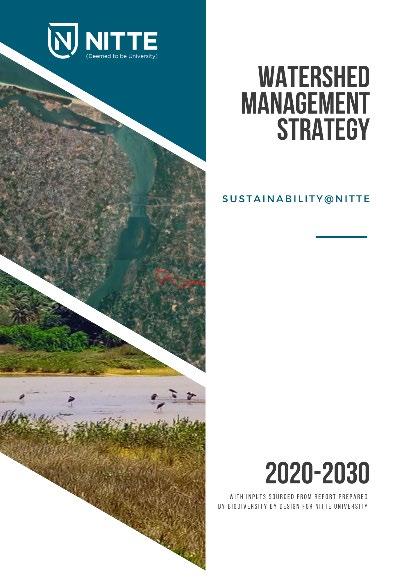
Click here for Report |


